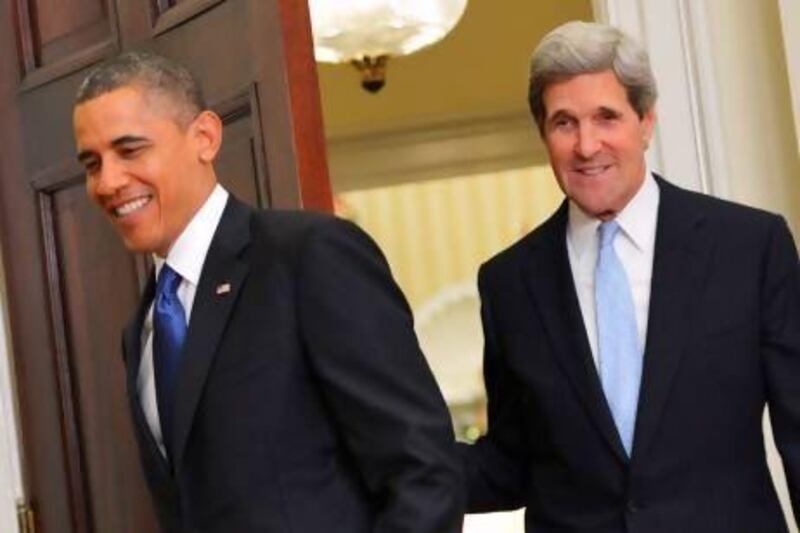NEW YORK // If John Kerry, a US Senator, is confirmed as the next secretary of state, he will be quickly tested by two of the Middle East's most pressing issues - nuclear negotiations with Iran and the Syrian civil war.
He would face these challenges while having to navigate sharp budget cuts and a desire by the president to focus on US interests in east Asia.
Although the first choice to replace Hillary Clinton as the country's top diplomat was UN ambassador Susan Rice, analysts say that Mr Kerry was perhaps the best candidate for the job.
In an era of partisan acrimony in Congress, Mr Kerry's stature among legislators from both parties and the relationships forged with foreign-policy players during decades in the Senate foreign relations committee will be important assets.
"He has great prestige and is very well regarded in Congress," said David Pollock, a state department official under former presidents Bill Clinton and George W Bush, who is now a senior fellow at the Washington Institute for Near East Policy.
"Kerry has a very solid record of personal high-level experience in foreign policy, which is actually not always the case with some of our more senior officials," Mr Pollock said.
Mr Kerry also has a natural preference for the policies of multilateralism and negotiation that the president, Barack Obama, has made a doctrine abroad as the country has come to grips with the limits of its power in global affairs and economic recession at home.
At the beginning of the Arab Spring, Mr Kerry visited President Bashar Al Assad in Damascus, who he tried to persuade to take a different path. "I think that was an indication of a broader tendency on his part," said Mr Pollock. "That is his inclination most likely, obviously not with Syria anymore, but with Iran."
Tehran's nuclear programme is set to be the first major issue on the next secretary of state's agenda. Reports suggest that a timetable for fresh negotiations with Iran over its programme may soon be set. There is a small window of opportunity between now the beginning of Iran's presidential election campaigning in the spring.
Analysts say that US sanctions are beginning to pay dividends, and that a growing bloc in the Iranian regime's establishment is eager for a negotiated settlement.
Mr Kerry has supported a deal with Iran in the past and has spoken out against military action. His skills in diplomacy will now be put to the test. "We have two or three months of negotiating time now, so the new secretary would be very much involved in that," said Allen Keiswetter, a former state department official now with the Middle East Institute think tank in Washington.
While the Iranians may offer some concessions, a final settlement is unlikely, the analysts said. "Kerry would be well placed to manage this kind of holding pattern - keeping the pressure on and reaching some kind of temporary middle ground but avoiding a final ultimatum," Mr Pollock said.
Syria will also be at the forefront of Middle East issues occupying the new secretary. "I think things will change in the first half of 2013 in Syria fairly rapidly," Mr Keiswetter said. "It's not a question of if Assad goes but when." A negotiated settlement is unlikely but, with some signs that Russia is reconsidering its position and Iran engaged on the nuclear issue, Mr Kerry may at least try to cobble together a less-bloody alternative, he added.
Many leaders in the Gulf have expressed alarm at the US administration's stated goal of a long-term "pivot" of resources and institutional focus away from the Mideast and towards east Asia, where Washington sees its future strategic interests.
"I think the administration is right in that the long-term geopolitical problems in the management of relations with China and the move to Asia, but the urgent situation of today is still largely in the Mideast," Mr Keiswetter said.
One of Mr Kerry's responsibilities will be in convincing Gulf leaders more engagement with Asia "doesn't mean we're abandoning our very important friends in the Gulf and our interests there", Mr Pollock said. Even with the US shifting to North American energy sources, "the short term wild cards have the US more involved in the Gulf, not less".
The peace process between Israel and the Palestinians would most likely not receive the same level of attention during Mr Obama's second term. "The reality is that the obstacles are very great", Mr Pollock said. "Kerry will say the right things … but this is not going to be the first order of business."
tkhan@thenational.ae





